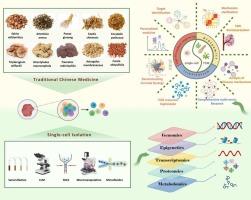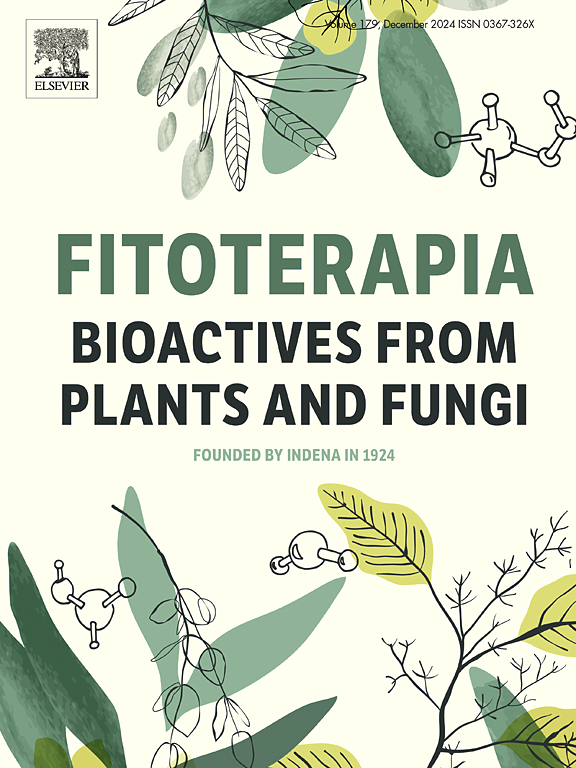利用单细胞组学技术革新中药药理研究
IF 2.6
3区 医学
Q3 CHEMISTRY, MEDICINAL
引用次数: 0
摘要
传统中医(TCM)提供了一种整体的医疗保健方法,但其多组分配方和多靶点机制的巨大复杂性阻碍了其现代化。传统的整体水平分析未能捕捉到中医治疗效果背后的细胞异质性,导致其经验成功与机制理解之间存在实质性差距。本文系统综述了单细胞组学技术(转录组学、蛋白质组学、代谢组学)在中药药理研究中的应用。更重要的是,我们认为这些技术代表了一种范式转变,提供了一个前所未有的高分辨率工具包,将中医的整体原理解构为细胞和分子生物学的精确语言。我们强调了单细胞组学如何通过以下方式革新中医研究:(1)识别活性化合物和配方靶向的特定细胞亚型;(2)通过揭示不同细胞群间的协同反应,阐明中药组合的协同作用机制;(3)为嗜器官和辨证等中医概念提供细胞水平的基础;(4)揭示中医如何通过重新平衡整个细胞生态系统来实现稳态调节。单细胞组学技术是中医药现代化和全球化的强大推动力。通过弥合整体理论和细胞水平证据之间的差距,他们不仅验证了中医的科学基础,而且为发现新的治疗靶点和开发更精确、个性化的治疗策略铺平了道路。这篇综述为未来的突破奠定了基础,将单细胞组学定位为下一代中医药理学的基石。本文章由计算机程序翻译,如有差异,请以英文原文为准。

Revolutionizing pharmacological research of traditional Chinese medicine with single-cell omics technologies
Traditional Chinese Medicine (TCM) offers a holistic approach to healthcare, yet its modernization is hindered by the immense complexity of its multi-component formulations and multi-target mechanisms. Conventional bulk-level analyses fail to capture the cellular heterogeneity underlying TCM's therapeutic effects, resulting in a substantial gap between its empirical success and mechanistic understanding. This review aims to systematically summarize the applications of single-cell omics technologies (transcriptomics, proteomics, metabolomics) in TCM pharmacological research. More importantly, we propose that these technologies represent a paradigm shift, providing an unprecedented high-resolution toolkit to deconstruct the holistic principles of TCM into the precise language of cellular and molecular biology. We highlight how single-cell omics are revolutionizing TCM research by: (1) identifying the specific cell subtypes targeted by active compounds and formulas; (2) elucidating the synergistic mechanisms of herbal combinations by revealing coordinated responses across different cell populations; (3) providing a cellular-level basis for TCM concepts such as organotropism and syndrome differentiation; and (4) revealing how TCM achieves homeostatic regulation by rebalancing entire cellular ecosystems. Single-cell omics technologies are powerful drivers for the modernization and globalization of TCM. By bridging the gap between holistic theory and cellular-level evidence, they not only validate the scientific basis of TCM but also pave the way for the discovery of novel therapeutic targets and the development of more precise, personalized treatment strategies. This review lays the groundwork for future breakthroughs, positioning single-cell omics as a cornerstone of next-generation TCM pharmacology.
求助全文
通过发布文献求助,成功后即可免费获取论文全文。
去求助
来源期刊

Fitoterapia
医学-药学
CiteScore
5.80
自引率
2.90%
发文量
198
审稿时长
1.5 months
期刊介绍:
Fitoterapia is a Journal dedicated to medicinal plants and to bioactive natural products of plant origin. It publishes original contributions in seven major areas:
1. Characterization of active ingredients of medicinal plants
2. Development of standardization method for bioactive plant extracts and natural products
3. Identification of bioactivity in plant extracts
4. Identification of targets and mechanism of activity of plant extracts
5. Production and genomic characterization of medicinal plants biomass
6. Chemistry and biochemistry of bioactive natural products of plant origin
7. Critical reviews of the historical, clinical and legal status of medicinal plants, and accounts on topical issues.
 求助内容:
求助内容: 应助结果提醒方式:
应助结果提醒方式:


